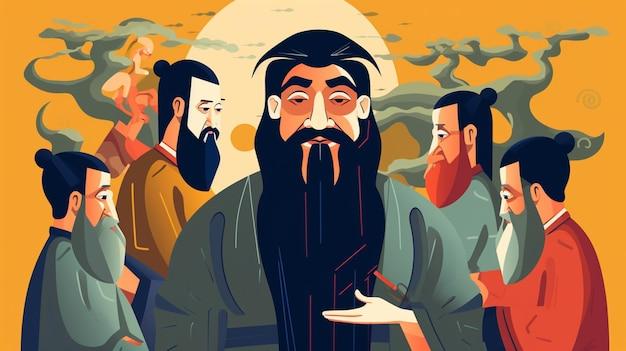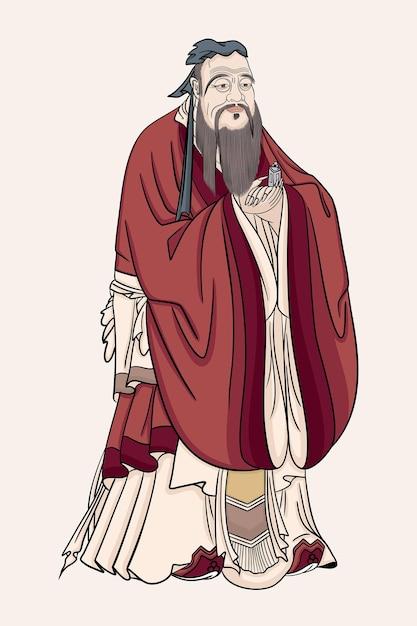Confucianism, an ancient Chinese philosophy that has endured for centuries, holds a special place in the hearts and minds of millions. At its core, Confucianism emphasizes the importance of moral harmony, social order, and personal integrity. Its teachings have shaped the ethical fabric of countless individuals and influenced societies around the world. But who are the key figures that have paved the way for this enduring philosophy?
In this blog post, we will delve into the lives and contributions of some of the most important figures in Confucianism. From the revered founder, Confucius himself, to the influential Mencius and Xunzi, we will uncover the stories and teachings of these remarkable individuals. Join us on this journey as we explore the profound wisdom and timeless lessons that have shaped Confucianism into what it is today. So, grab a cup of tea and let’s delve into the world of Confucian thought!

Who are Some Influential Figures in Confucianism
Confucianism, the ancient Chinese philosophy that emphasizes moral values, social order, and familial respect, has produced a multitude of influential figures throughout history. These individuals have made significant contributions to the development and spread of Confucian teachings, shaping the philosophy as we know it today.
1. Confucius
No discussion of Confucianism would be complete without mentioning its central figure and namesake, Confucius himself. Born in 551 BCE, Confucius dedicated his life to studying and teaching moral principles. His teachings, compiled in the Analects, have had a profound and lasting impact on Chinese society. Confucius advocated for the importance of cultivating personal virtue, maintaining social harmony, and adhering to a proper hierarchy in relationships. His emphasis on education, ethics, and the cultivation of character continues to shape Confucian thought.
2. Mencius
Mencius, also known as Mengzi, was a philosopher who lived during the 4th century BCE. Often considered the second most important figure in Confucianism after Confucius himself, Mencius expanded upon and developed Confucian teachings. He focused on the innate goodness of human nature, arguing that people are born with certain moral inclinations that can be nurtured and cultivated. Mencius championed the importance of benevolence, righteousness, and empathy, stressing the significance of these virtues in fostering a just and harmonious society.
3. Xunzi
Xunzi, a philosopher who lived during the 3rd century BCE, presented a contrasting view to Mencius’ belief in the goodness of human nature. He argued that people are inherently selfish and require strict moral discipline to overcome their base desires. Xunzi emphasized the role of education and ritual in shaping individuals’ behavior, advocating for the importance of following strict moral customs and etiquette. His writings influenced subsequent generations of Confucian scholars, adding a dimension of discipline and structure to Confucian thought.
4. Zhu Xi
Moving forward to the Song Dynasty in the 12th century CE, Zhu Xi played a significant role in reviving and interpreting Confucian teachings. He developed a system called Neo-Confucianism, which blended Confucian philosophy with elements of Buddhism and Taoism. Zhu Xi emphasized the study of the Four Books, a collection of Confucian texts, and promoted the idea of moral self-cultivation to achieve personal and societal harmony. His interpretations and commentaries on Confucian classics became widely influential, shaping Confucian thought in East Asia for centuries to come.
5. Wang Yangming
During the Ming Dynasty in the 16th century CE, Wang Yangming emerged as one of the most influential Confucian scholars of the period. He sought to reconcile the ideas of Mencius and Xunzi, arguing that human nature is fundamentally good but can be easily corrupted. Wang Yangming emphasized the importance of self-reflection and introspection to cultivate moral character. His emphasis on the unity of knowledge and action, stressing the significance of putting Confucian values into practice, had a lasting impact on Confucian thought and its application in daily life.
These are just a few of the many important figures in Confucianism. Their teachings and interpretations have shaped the philosophy over centuries, influencing not only China but also the broader East Asian cultural sphere. Exploring their contributions allows us to gain a deeper understanding of Confucianism’s enduring significance and its impact on individuals and societies alike.
So, next time you find yourself pondering the moral complexities of life, take a moment to appreciate the wisdom of Confucianism and the figures who have dedicated their lives to its pursuit.

FAQ: Who are Some Key Figures in Confucianism
Welcome to our comprehensive FAQ-style guide on Confucianism! In this section, we’ll answer some burning questions about important figures in Confucianism, shedding light on their significance and contributions. So, let’s dive right in!
What’s the Meaning of Xin
Ah, Xin, the heart of Confucianism! Pronounced “sheen” (say it right!), Xin is the Chinese term for heart or mind. But hold on, don’t confuse it with your pumping organ. In Confucianism, Xin refers to the moral consciousness, the seat of virtues, and the reservoir of wisdom. It’s like having a tiny Confucius residing inside you, guiding your actions and thoughts.
Who Are the Founders of Confucianism
Let’s meet the brainiacs behind Confucianism! Confucius, also known as Kongzi, was the main dude who laid the foundation for this ethical and philosophical system back in the 6th century BCE. But hey, he didn’t work alone! He had a bunch of dedicated disciples who soaked up his wisdom like sponges. These followers, including Yan Hui, Zengzi, and Mencius, played a vital role in spreading and developing Confucian teachings.
How Do You Pronounce Xin
Alright, let’s clear the air on this one. It’s pronounced “sheen” with an “sh” sound, not “ex-in” or “zine.” So, if you want to impress your Confucianism-savvy friends, make sure you say it right. And trust me, nobody wants to hear about how “sheen” you are, unless you’re Charlie.
What Does Xin Mean in Confucianism
Xin has a lot packed into its tiny three-letter word. In Confucianism, Xin encompasses the essence of being humane, embodying virtues like love, righteousness, and respect. It’s about cultivating your character to live a meaningful and purposeful life. So next time you’re pondering the philosophy of Confucianism, remember that Xin holds the key to being a virtuous human being.
What Was Confucius’s Golden Rule
Ah, the golden rule of Confucius, the shining star of morality! Confucius said, “Do not do to others what you would not like them to do to you.” It’s like the ancient Chinese version of “treat others as you want to be treated.” Simple, right? Confucius believed that this principle formed the cornerstone of a harmonious and just society. So, be kind, folks, and spread some Confucian love!
Who are Some Important Figures in Confucianism
Confucianism has its fair share of VIPs. Aside from Confucius himself, there are a few notable figures worth mentioning:
-
Mencius: This guy, also known as Mengzi, expanded upon Confucian teachings and emphasized the inherent goodness of human nature. He believed that humans are born with compassion and the ability to be virtuous.
-
Xunzi: Known for his philosophical debates with Mencius, Xunzi took a more pessimistic view of human nature. He believed that people are born with selfish tendencies and require strict moral guidance to become virtuous.
-
Zhu Xi: Jumping forward to the Song Dynasty, we have Zhu Xi, whose Neo-Confucianism had a massive impact on Chinese culture. He combined Confucian teachings with elements of Buddhism and Taoism, creating a potent intellectual brew.
-
Wang Yangming: Moving on to the Ming Dynasty, Wang Yangming rejected the idea that knowledge alone leads to virtue. He emphasized the importance of self-reflection and maintaining a sincere heart (“xin,” remember?) to cultivate moral character.
These individuals played crucial roles in shaping the development and understanding of Confucianism throughout history. Kudos to them!
This concludes our FAQ on important figures in Confucianism. We hope this dive into the heart of Confucian philosophy has brought both enlightenment and a few smiles to your face! Remember, Xin is the key, so let your moral consciousness guide you on a virtuous path.
